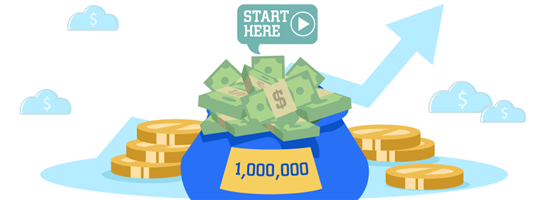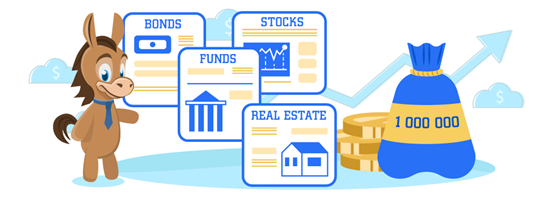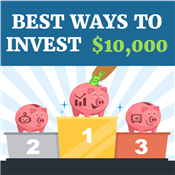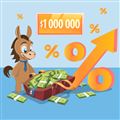How and Where to Invest $1 Million Dollars
Ad Disclosure: This article contains references to products from our partners. We may receive compensation if you apply or shop through links in our content. This compensation may impact how and where products appear on this site. You help support CreditDonkey by using our links.
How can you invest 1 million dollars? Many choose stocks and real estate but there are more ideas than you think. Here's what to do with that cash.
 |
$1 million is a lot of money, but you can't live off that forever.
You don't want to risk losing it. But parking it in a checking account is like leaving money on the table.
Stop holding yourself back. If you invest wisely, you can generate steady passive income. Just be sure to avoid certain investments (detailed below).
Here are 10 smart ideas to make the most of your million dollars:
- Stock Market
- ETFs and Mutual Funds
- Real Estate
- Peer-to-Peer Lending
- Bonds
- CDs
- Savings Accounts
- Cryptocurrency
- A New Business
- Invest in Yourself
What to Do Before Investing $1M
- Pay Off All Debt
Ensure your debt is under control by paying off any outstanding revolving loans, like credit card debt. These are typically high-interest debts and can take away from your investment returns. - Boost Your Emergency Fund
As a rule of thumb, try to save at least 3 months of living expenses, especially if you are considering higher-risk investments. If something happens to your money, this can save you from financial stress. - Figure Out a Base Guaranteed Income
If you don't want to rely on your investments for income, determine how much you need to set aside to act as your base income before you invest the rest. - Secure Your Retirement
It's crucial to review your retirement plan and make sure you are on track to retire comfortably before you invest. If you're hoping to fund your retirement with your investments, consider setting aside a base amount first.
With $1 million, you are in a financial position to seriously consider buying life insurance. These policies protect your family from financial hardship in the event of your death.
Term life insurance: Term life insurance is usually less expensive, but it only covers you for a particular period of time. Once your policy ends, you do not recoup your funds.
Whole life insurance: Whole life insurance is a policy that covers you until your death. It also includes a cash value component, so when you buy whole life insurance, you do not lose those funds.
Deciding How to Invest
Before you invest, consult with a professional to review your overall financial health. They'll likely ask about the following three things to get an idea of which investments are best for you:
Your financial goals
Of course, everyone's main goal is to make more money. Try to think more specifically about what you're trying to achieve.
Do you want to secure a retirement? What kind of lifestyle to you want to fund in that retirement? Or do you want to save up for a major purchase like real estate? Are you saving for your child's college, or trying to generate a steady cash flow?
Make sure you are clear on how you plan to use the money you make investing your $1 million before you choose the best investment strategy.
Your investing timeline
Everyone has a different investing timeline, meaning how long they plan to keep their money invested. In many cases, your age has a role in determining your investing horizon.
For example, a younger investor may plan to invest their funds for several decades while an investor closer to retirement years may want to use their money in a few years.
Knowing how long you plan to stay invested can help you determine the best investment method for you.
Your risk tolerance
Just like some people are introverted and some people are extroverted, some people want to take on more risk and others want to feel more secure. The benefit of taking on more risk is that you can reap more gains. The downside is that losses can be greater as well.
Typically, younger investors tend to have a higher risk tolerance because they have a longer investing timeline to weather the ups and downs of the market.
Risk tolerance plays a key role in what will be the best way for you to invest $1 million. Think carefully about how much risk you want to take on.
10 Ways to Invest $1 Million
 |
| © CreditDonkey |
Once you've mapped out your financial goals and defined your investing style, you can start exploring ways you can make your money work for you.
1. The Stock Market
When most people think of investing, they think of the stock market. Buying into stocks is fairly risky because shares can be affected by a number of factors, from economic turmoil to company-specific performance. On the other hand, the stock market has proved a successful investment strategy for many.
Within the realm of stocks, you can find a wide variety to invest in, from larger companies with lower risk to smaller startups with higher risk. Some stocks pay dividends for those looking for income. When you have $1 million to invest, remember to get advice from a professional before you buy stocks, especially if you're not familiar with the market.
2. ETFs and Mutual Funds
Buying into ETFs and mutual funds is similar to buying stocks, but there is one key difference: ETFs and mutual funds are naturally diversified.
Instead of investing in one company, investors are actually buying into a fund that holds several assets. With ETFs, the funds are traded on an exchange, whereas mutual funds are not.
3. Real Estate
With $1 million, you could easily buy a property, or several properties, that could net you a steady rental income. As with any investment, it pays to do plenty of research beforehand so that you can buy a property that maximizes profits.
You want a property that will generate a healthy rate of return from rent, but that is also likely to appreciate in value. A fixer-upper can result in larger profits, but be sure to factor in the cost and time you need for renovations.
Invest in Real Estate with $10+
- Only $10 minimum investment
- Get a diversified portfolio of real estate projects across the US
- Open to all investors
4. Peer-to-Peer Lending
Another way to invest $1 million is by funding loans to others. That way, you can earn a reliable income on the interest that the loans generate. With this strategy, you'll need to join a peer-to-peer (P2P) platform, which allows you to connect with borrowers all over the world.
As an investor, you may pay an origination fee, closing fee, or an annual fee. Lending Club and Prosper are the top two P2P platforms operating today. They work as the intermediary between you and the borrower. They fund the loans (after you pay them), collect payments, and help with litigation if the borrower defaults.
You can even diversify your risk by lending money to multiple borrowers at once. Your $1 million could fund many borrowers.
5. Bonds
If you are interested in protecting your $1 million while growing it modestly, you can consider buying a bond. It is basically just buying debt. You can invest in bonds much like you would stocks (read our guide for more information about the differences between stocks and bonds).
- Corporate, which are offered by corporations looking to raise capital
- Municipal, which are issued by towns, cities, and states to fund public projects
- Treasury, or T-bonds, which can be purchased directly from the U.S. government
Bonds also receive different ratings based on the credit of the issuer. Typically, you can calculate your return before you purchase a bond based on rate and period of maturity.
As with any investment, bonds do carry some risk. For example, when interest rates rise, bond prices fall. This means that if you choose to sell a bond before its maturity date, you could make less than the price you paid for it.
Bonds generally must be purchased through a broker, though T-bonds can be bought directly from the government.
6. CDs
If you are looking for a risk-free investment with decent returns, consider investing your $1 million in CDs. We recommend using an online bank rather than a traditional bank like Chase because they tend to offer higher rates.
With CDs, the longer you invest the money, the higher the APY (annual percentage yield). Also, the higher the account minimum required, usually the higher the APY.
High-Yield CD Rates - Up to 4.00% APY
- No fees
- $1 minimum deposit
- FDIC insured
| Term | CD Rates |
|---|---|
| 2 Month | 4.00% APY |
| 3 Month | 4.00% APY |
| 4 Month | 4.00% APY |
| 5 Month | 3.40% APY |
| 6 Month | 3.50% APY |
| 9 Month | 3.40% APY |
| 12 Month | 3.30% APY |
7. Savings Accounts
Savings accounts are another great place to park your money safely while earning additional money. When we talk about savings accounts, we don't mean the account at your local bank where you have a checking account. We mean online savings accounts, where you could obtain rates as much as 10 times higher than at your local bank. One such account, with a high APY, is CIT Bank's Platinum Savings (read our review). Take a look at our CIT promo code page to learn more.
You should consider a few things before you invest. Confirm that the FDIC insures the bank and read the fine print regarding withdrawals. Make sure you have access to your money when you need it. Some banks may charge fees for withdrawals or have required account minimums too.
CIT Bank Platinum Savings - 3.75% APY
- 3.75% APY with a balance of $5,000 or more
- 0.25% APY with a balance of less than $5,000
- $100 minimum opening deposit
- No monthly maintenance fee
- Member FDIC
8. Cryptocurrency
Aside from the traditional stocks and bonds, investors have become interested in alternative investments like cryptocurrencies. These have been drawing a lot of attention for their rapid growth potential. However, be warned that investing in uncharted territories carries a great deal of risk.
Most cryptocurrencies are extremely volatile, meaning their price fluctuates over short periods of time. This provides opportunities to make money faster than other methods. However, the bigger the opportunity, the greater the risk.
For example, Bitcoin peaked in 2017 at around $19,000. The price in early 2019 was roughly $4,000—a 79% drop in value. If you're not deterred by the risk, read our guide for more information on investing in cryptocurrency.
9. A New Business
If you are tired of the 9-to-5 grind, investing $1 million in your own business could be your chance to break free. Many entrepreneurs have started successful business with significantly less than that, so rest assured that $1 million is plenty of seed money to get started. But you'll need a great idea—and a solid business plan—before seriously considering starting your own business.
Unless you have a lot of experience in the industry, make sure you get the help necessary to help you succeed. We recommend visiting the Small Business Administration's website for advice on how to get started. They offer many resources and steps for beginners and even the experienced business owner.
10. Invest in Yourself
You won't need a full $1 million to invest in yourself, but taking a portion of your wealth for self-improvement can have good returns. Consider enrolling in educational courses that can further your career. Use your money to attend events where you can network for lucrative business deals.
3 Investment Types to Avoid
Keep in mind that many scammers try to prey on millionaires using the bait of good investment opportunities. Their "investments" aren't really investments at all. In fact, you could easily lose your $1 million if you put it into a risky scheme.
Here are some examples of what to avoid when looking to invest $1 million:
- Penny Stocks
Stocks that you can buy for less than $5 may seem like a great deal. After all, with $1 million, you could buy a lot of these shares and perhaps see your money draw massive profits. But more often, they're not profitable at all.Companies that offer penny stocks are usually very small companies that don't need to disclose their financials. They may be trying to raise capital to grow, but they're not always successful in the long run.
- Pyramid Schemes
You may have heard of businesses that promise to make you rich if you can recruit others to join them. If you're asked to pay to join a business with that type of model, be aware that it may be a pyramid scheme, which can't provide the win-win situation to everyone. - Gambling
Yes, you could possibly win big with gambling $1 million, but people rarely do. Statistically, you are much more likely to lose your money when you gamble. That's true whether you are playing in a casino or buying a lottery ticket. The odds are not in your favor, so, while gambling may be entertaining, it's a poor investment choice.
What Experts Say
CreditDonkey assembled a panel of industry experts to answer readers' most pressing questions.
Here's what they said:
FAQs
Can you live off the interest on $1 million?
You can live off the interest on $1 million, but you will have to budget carefully. You will also have to have a plan to protect your principal, which means avoiding risky investments.
The income from $1 million will be determined by how you invest it. Some investments provide more interest than others. If your investments are providing yields of 7%, you will receive an annual income of $70,000. If you are getting an interest rate of 3%, you can expect $30,000 annually.
How much will a $1 million dollar annuity pay?
A $1M annuity can pay anywhere from $50K to $80K a year. How much an annuity pays depends on several factors, including whether you want it to cover only you or you and a spouse. It also depends on when you want payments to begin and end.
Can you keep $1 million in the bank?
You can keep $1 million in the bank, but the FDIC only insures deposits up to $250,000. You can break up the $1 million into accounts at several banks for full protection.
Is $1 million enough to retire on?
Many people can retire on $1 million. Whether that amount is right for you depends on your retirement goals and how you invest the $1 million. You will need to factor in your planned retirement timeline.
What is the average retirement nest egg?
The average person retires with roughly $96,000 saved. However, retirement nest eggs vary widely. Some people are more comfortable in a modest retirement, while others need more income to support their lifestyle.
Bottom Line
With $1 million, you have a great opportunity to put your money to work for you. Consult with a professional financial advisor to weigh the pros and cons of each method of investing.
Make sure you know your goals and be aware of risky investments that may not be what they seem.
The bottom line is, the sooner you can start investing your funds in a safe way, the more you can benefit from the rewards of your investment.
Write to Rebecca M at feedback@creditdonkey.com. Follow us on Twitter and Facebook for our latest posts.
Note: This website is made possible through financial relationships with some of the products and services mentioned on this site. We may receive compensation if you shop through links in our content. You do not have to use our links, but you help support CreditDonkey if you do.
Fundrise, LLC ("Fundrise") compensates CreditDonkey Inc for new leads. CreditDonkey Inc is not an investment client of Fundrise.
|
|
| ||||||
|
|
|













